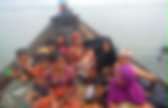

Traffickers exploit Rohingya Muslims fleeing Myanmar - BBC News. Revealed: how the Thai fishing industry traffics, imprisons and enslaves. Rohingya migrants trafficked through deadly jungle camps have been sold to Thai fishing vessels as slaves to produce seafood sold across the world, the Guardian has established.
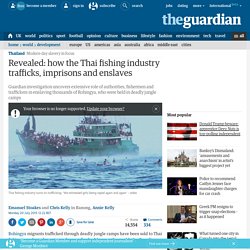
So profitable is the trade in slaves that some local fishermen in Thailand have been converting their boats to carry Rohingya migrants instead of fish. A Guardian investigation into Thailand’s export-orientated seafood business and the vast transnational trafficking syndicates that had, until recently, been holding thousands of Rohingya migrants captive in jungle camps, has exposed strong and lucrative links between the two. Testimony from survivors, brokers and human rights groups indicate that hundreds of Rohingya men were sold from the network of trafficking camps recently discovered in southern Thailand.
According to those sold from the camps on to the boats, this was frequently done with the knowledge and complicity of some Thai state officials. Thailand’s seafood industry is worth an estimated $7.3bn a year. Burma. Malaysia says it will turn away migrants stranded at sea unless boats are sinking. A crisis involving boatloads of Rohingya and Bangladeshi migrants stranded at sea has deepened as Malaysia said it would turn away any more of the vessels unless they were sinking.
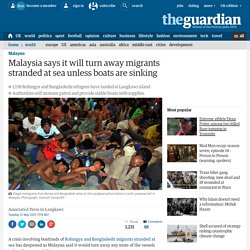
The waters around Malaysia’s Langkawi island – where several crowded, wooden vessels have landed in recent days carrying more than 1,000 men, women and children – would be patrolled 24 hours a day by eight ships, said Tan Kok Kwee, first admiral of Malaysia’s maritime enforcement agency. “We won’t let any foreign boats come in,” Tan said on Tuesday. If the boats are sinking, they would rescue them, but if the boat are found to be seaworthy, the agency will provide “provisions and send them away”, he said.
South-east Asia is in the grips of a spiralling humanitarian crisis as boats packed with Rohingya and Bangladeshis are being washed ashore, some after being stranded at sea for more than two months. “I can hear the children crying, I can hear them crying,” she said. 'They hit us, with hammers, by knife': Rohingya migrants tell of horror at sea. Crowded under tarpaulin tents strewn with rubbish and boxes of water, the Burmese and Bangladeshi migrants speak of horrors at sea: of murders, of killing each other over scarce supplies of food and water, of corpses thrown overboard.
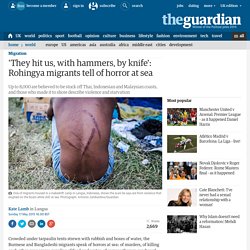
“One family was beaten to death with wooden planks from the boat, a father, a mother and their son,” says Mohammad Amin, 35. “And then they threw the bodies into the ocean.” Amin, an ethnic Rohingya Muslim, first boarded a boat from Burma three months ago. Now he is among 677 migrants who arebeing housed in a makeshift camp by the harbour in Langsa, Indonesia, after spending months in the Andaman Sea.
Getting to the camp was an epic struggle. But at least now they are on dry land. Mohammad Rafique, 21, says that when the boat he was on first floated into Indonesian waters last week, the navy gave them provisions of food and water. In Malaysia they were met with the same response. No one can say exactly how many people passed away on board. Asian migrant crisis grows as 700 asylum seekers rescued off Indonesia.
Another 700 Rohingya and Bangladeshi migrants were rescued off Indonesia on Friday, police said, as Burma undermined calls for a coordinated response to the human-trafficking crisis by threatening to boycott a planned south-east Asia summit.
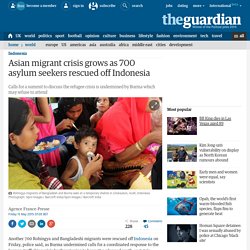
Indonesian police said passengers aboard the latest vessel seeking safe harbour in the region recounted how their boat sank off the country’s coast after earlier being driven away by Malaysia. Activists estimate up to 8,000 migrants are at sea in south-east Asia. But the decision by Indonesia, Malaysia and Thailand to turn away stricken boats filled with starving Bangladeshis and ethnic Rohingya from Burma has been met with outrage, including from the US and UN. “According to initial information we got from them they were pushed away by the Malaysian navy to the border of Indonesian waters,” said Sunarya, police chief in the city of Langsa in Aceh province, where the migrants arrived.
“We gave them ready-to-eat meals. How to solve the Asian migrant boats crisis – expert views. Between 6,000 and 8,000 refugees, asylum seekers and economic migrants from Burma and Bangladesh are currently stranded in boats off the coasts of Malaysia, Thailand and Indonesia, with the governments of all three nations refusing to allow the boats to land.
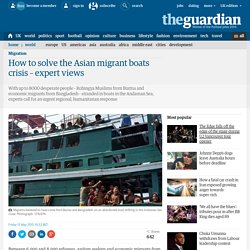
With reports of deaths on board and thousands more lives at risk, the Guardian asked a panel of experts how the crisis could be solved. Lilianne Fan Bangkok-based expert on humanitarian and conflict issues in Asia, research associate at the humanitarian policy group of the UK’s Overseas Development Institute The solution really has to be a humanitarian approach, making sure lives are not lost and looking at temporary solutions in each of the affected countries – Malaysia, Thailand and Indonesia. Fundamentally this is an issue of statelessness and citizenship. The temporary solution is a settlement arrangement for the asylum seekers and refugees who are coming to these countries. Charles Santiago David Manne Jeff Labovitz.